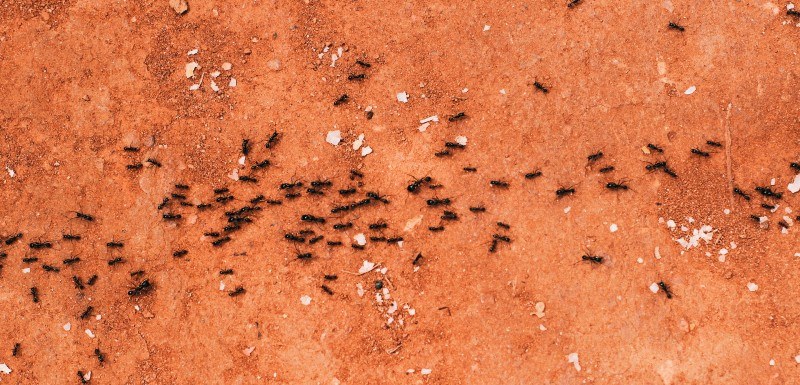In a recent survey conducted by Chapman University, a full 25% of respondents reported being afraid of insects and/or spiders. For comparison? That’s a larger percentage than the people who reported being afraid of dying.
The reality is that insects often evoke a visceral feeling of either disgust or fear (and sometimes both) that can be overwhelming and hard to get past. For this reason, ensuring that your home is “bug free” before going to sale is an important - though sometimes overlooked - necessity. Here's why pest inspections matter.
Signs of an Infestation
Sometimes, signs of an insect infestation are obvious. Other times, it takes a practiced eye to see the signs of inhabitation. It's not unusual for insects to "fly under the radar" - so to say - until they have established a sizable and unmistakeable presence in your home. Here are some of the tell-tale signs to look out for, for several common insect pests.
Termites
- Squeaky floorboards
- Stuck windows
- Mud tubes along the foundation
- Hollow-sounding wood
- Drywood pellets along windowsills
- Tiny holes in the drywall
- Wings (when termites swarm, they fly, then shed their wings)
Roaches
- Droppings (resemble pepper, or ground coffee)
- Egg capsules
- Strange smell (caused by pheromones in their droppings)
Ants
- Wall noise (check at night, when carpenter ants are most active)
- Hollow-sounding wood
- Wood shavings
Fleas
- “Flea dirt”: reddish-brown feces
- Insect bites
- Itchy pets
Powderpost Beetles (Southern US)
- Small, round holes in wood
Bees
- Increased number of bees around home
- Dark patches on walls and ceilings
Bed Bugs
- Insect bites while sleeping
- Dots of blood on bedding
- Dark spots on walls

How Insects Can Impact Property Value
Some mortgage lenders - and some states - require wood infestation inspections as part of disclosure. And if you do know of damage from insects - even if it’s in the past - that is something that needs to be noted in any disclosure statement.
Florida is among the states requiring wood inspections: “Florida specifies that independent WDO (Wood Destroying Organisms) inspectors are needed for insect inspections, under Florida Statute 468.83. These inspectors can find the tell-tale holes, fecal pellets, and tunnels left by termites and other pests,” notes our post on buying a home in Orlando. Termites are the typical insect found in this inspection, but certain types of ants and other boring insects may be present.
This pest inspection is separate from the home inspection and can typically cost an additional $100-$300 depending on where you live, the size of your home, etc.
Be pro-active and get your home checked before you show it
There’s also the ick/scare factor to keep in mind: even if spiders are actually helpful in removing insects from your home, a spider infestation and visible webbing in every corner will be a turnoff for most buyers.
"When someone is looking at a home to buy, it's a disaster if the buyer sees pests during their tour. Ants, cockroaches, rats, and spiders are a few pests that give people a fear or disgust reaction that you don't want to be associated with your home," notes Wesley Wheeler, insect expert at Bug Lord.
"Doing a pre-emptive pest control treatment around your home is very cheap compared to all other home selling expenses whether it's hiring a professional or doing it yourself. You can usually get a professional treatment done for $100-200, which should knock down the insect population in 24-48 hours and it's effective for anywhere from 30-90 days."
How to Get Rid of Insects
Get rid of unwanted bugs as soon as you notice them - never wait, since it’s easier to mitigate damage earlier on.
Some insects are nuisances that can be easily dealt with by yourself. Maggots in the kitchen, for example, or moths in the pantry, are often symptomatic of a moth infestation. Tightly sealing up all open food items and using clips and tupperware for storage can prevent moths from laying eggs in food.
Mild ant infestations can also be handled with store-bought bait - look for borax as an ingredient, as this ingredient is often highly effective while not being as potentially harmful for pets and people as other pesticides can be. Liquid ant baits are typically rated as the most effective solutions.
Older homes settle and break down over time, allowing for small holes and cracks through which insects can crawl through. If you have an older home, keep in mind that insects only need a few millimeters of space to penetrate a home. According to Dodson Pest Control, when it comes to plugging up small holes:
“Some concrete for a patch or some silicone or caulk will generally do the job. For larger projects, sometimes you will need some tin flashing or something else to correctly fill a larger hole. Do not use expandable foam or steel wool since they break down with the elements.”
The most common entry points for pests include the garage, roof and the basement - though they can come through cracks in the doors and windows as well. An easy way to check for well-sealed doors is to view them from the outside at night. If you can see light coming in through the perimeter, that means there’s a gap that insects can climb through.
If you’re dealing with something closer to an infestation (such as termites) rather than a nuisance (such as fruit flies), hire exterminators to make sure you get the job done right if you’re going to sell your home. You don’t want to go through the entire home sale process, only to have the sale fall through because live insects were discovered during the inspection.
How Much Do Pest Control Services Cost?
According to Home Guide, the cost to hire an exterminator ranges from $250 to $400 - and the price can vary depending on the extent of the issue, the type of pest, and by region.
On the low end, ant treatment can cost around $250, whereas termite control can come in closer to $1,000 on average. Some homes/issues require monthly visits from an exterminator, in which case you can expect to pay closer to $40-$45 each time.
Look for:
- Online reviews for exterminators
- Companies that are licensed, bonded and insured
- Whether treatments come with a guarantee (such as 90 days guaranteed pest free)
- Whether exterminators charge extra for additional square footage



